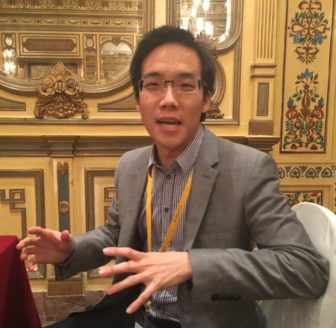Worried that your email is not secure? You should be. Sending a routine email is like writing your message on an old postcard sent through hand-delivered mail.
Developed decades ago, the data encryption program PGP (Pretty Good Privacy) is still the best option to secure communications, experts say. Because PGP can be complex, several more user-friendly products have been developed to make email encryption available to everyone.
One solution was developed by Andy Yen, a former particle physicist for European Organization for Nuclear Research (CERN). Yen and his Switzerland-based colleagues have developed the encrypted email service ProtonMail, which now has over a million users in over 150 countries.
Freelance writer Karin Stephan sat down with Yen at the Uncovering Asia 2016 conference in Kathmandu, Nepal to get his take on digital security.
Can email communication be secure and simple at the same time?

Karin Andrea Stephan
Co-founder and CEO of ProtonMail Andy Yen held an email encrypting workshop for journalists at Uncovering Asia 2016.
What I always tell people is: there is no such thing as 100 percent security. By definition, that does not exist. But I think for journalists or people in the media, it’s prudent to have at least a reasonable level of security. The way to do this in the past was always PGP, which still is the best way to encrypt email. But the main problem is: it’s very difficult to use.
Are products like ProtonMail secure enough for investigative journalists who need to protect their sources?
As a journalist, if you’re not using any encryption at all, you’re like a war photographer going into a war zone without a helmet. As a war photographer that seems very obvious because you can understand the threat of bombs and bullets. But cyber is very much invisible to people. So many journalists are going out, talking to sources with no protection at all. In that case, using PGP through ProtonMail definitely is an improvement upon that. However, even though our war photographer has a helmet, that doesn’t mean he is invincible. Same thing with PGP: it’s actual protection, but not a guarantee of safety.
Why are you based in Switzerland?
Our team is quite diverse, we have around 20 people from ten different countries. The origin of ProtonMail came from CERN, a nuclear research lab based in Switzerland [which] historically has a very strong respect for privacy. This is something you don’t find in many other countries. In Switzerland we have an environment where we don’t come under harassment, the government doesn’t pressure us, and we can really operate and develop these services without constraints. That, to us, is very valuable.
What can ProtonMail do for the journalists at the Uncovering Asia 2016 conference, in particular?
We already have a lot of users in Asia, [which became more prominent] during the Hong Kong protests. Also, in mainland China it’s quite common use as a way to avoid mass surveillance from the government. I think ProtonMail in Asia is a way to ensure the freedom of speech and the freedom of information [and] it’s something that we see far more need for in many countries around the world. But in Asia, at this time, with the rise of surveillance, the growing power of China, it’s particularly relevant.
 Karin Andrea Stephan is a freelance writer from Switzerland, living in Singapore.
Karin Andrea Stephan is a freelance writer from Switzerland, living in Singapore.
